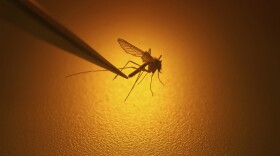-
The country's toll makes up nearly a third of the world's 619,000 malaria deaths each year. Now Nigeria has approved a new vaccine. Will it get into the arms of those who need it most?
-
After 20 years without a reported local case, malaria is spreading again in the United States. Four people in Florida and one in Texas caught the disease locally, according to the CDC.
-
Four of the cases were found in Florida, while the fifth was logged in Texas, according to the Centers for Disease Control and Prevention.
-
Volunteers for the trial put an arm over a box with hundreds of mosquitoes carrying a genetically modified malaria parasite. Here's why they did it that way — and why the trial holds promise.
-
Resistance to the drug artemisinin was confirmed in Africa. Without better surveillance, experts say it is hard to track the threat.
-
The vaccine is called Mosquirix, a nod to the mosquitos that spread the malaria parasite when they bite.
-
It's also the first vaccine against a parasitic disease in humans. But there are issues to consider, from its rate of effectiveness to the dosage schedule.
-
Did you even know the U.S. has a malaria czar? Who himself had malaria as a kid? We interview Dr. Raj Panjabi, newly appointed by President Joe Biden.
-
It all started when a London primary school asked children to bring in a plastic tube containing approximately one tablespoon of homemade soup.
-
Mutant parasites have built up resistance to first-line malaria drugs, according to two new studies in The Lancet. Scientists worry that this could overturn global progress against the disease.
Play Live Radio
Next Up:
0:00
0:00
Available On Air Stations










